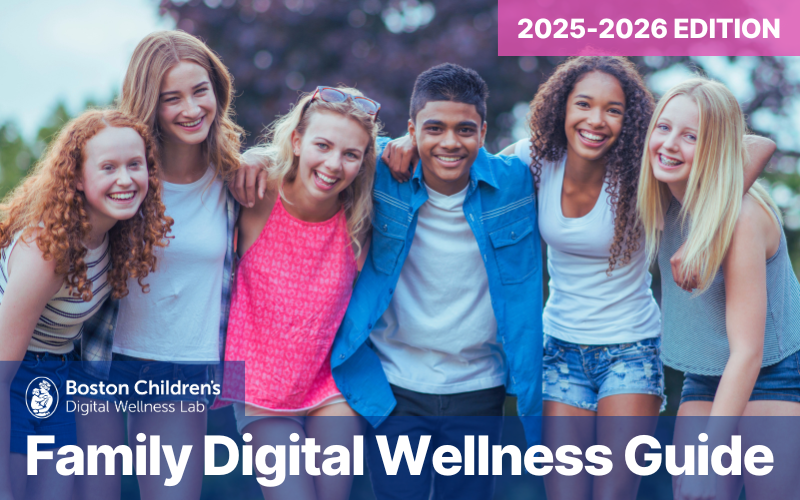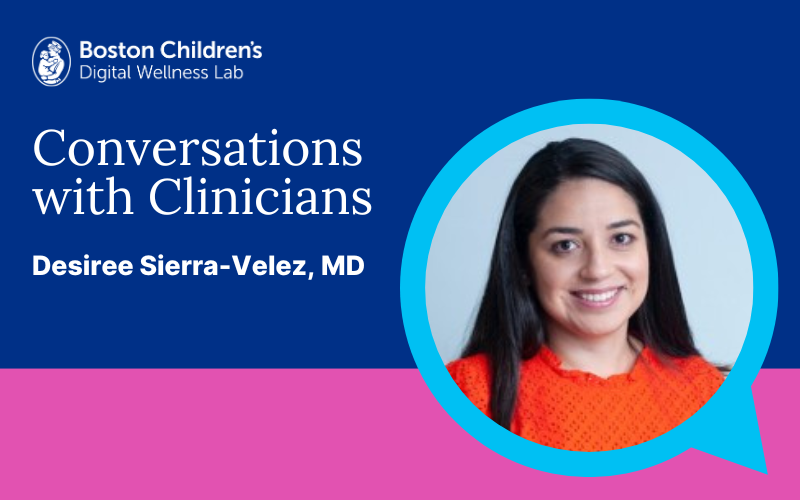Desiree Sierra-Velez, MD
Attending Physician, Division of Gastroenterology, Hepatology and Nutrition, Boston Children’s Hospital
Medical Director, Adolescent Bariatric Surgery Program, Boston Children’s Hospital
Instructor of Pediatrics, Harvard Medical School
What does a “day in the life” typically look like for you?
One of the things I love about my job is that every day is different. I have a few different clinical roles at Boston Children’s Hospital and I’m privileged to be able to collaborate with different disciplines to deliver the best care possible.
- As a pediatric gastroenterologist, I sometimes spend the entire day seeing patients in consultation for common gastrointestinal and nutritional issues. Other days, I also work as one of the pediatric gastroenterologists within the Growth and Nutrition Program, which treats young children with feeding and nutritional issues. In this setting, my role is collaborative with registered dietitians, feeding therapists, feeding psychologists, social workers and nurses to support these families in their journeys. I make sure that the underlying reason for these problems are investigated so as to ensure the success of any nutritional and behavioral treatment that is recommended.
- As the medical director of the Adolescent Bariatric Surgery Program, I serve as one of the medical professionals evaluating patients prior to and following weight loss surgery. This can include assessing medical readiness for surgery and monitoring for complications afterwards. This role is also in collaboration with a surgeon, registered dietitians, an endocrinologist, psychology and social work. About once a month, I also do endoscopic procedures.
- For my inpatient time, I serve as the nutrition attending in the Center for Nutrition. My role is to oversee provision of parenteral (intravenous) nutrition alongside dietitians and pharmacists to ensure its safety and appropriateness, and to evaluate children with complex nutritional needs all over the hospital.
- When I’m not in the clinic, I do care coordination for patients and also complete notes from the clinic as needed. I also use this time for scholarly pursuits like some research, projects with national professional societies, and self-study.
What led you to the work you do?
I became a pediatric gastroenterologist because I was fascinated by how digestive diseases occur, particularly Inflammatory Bowel Disease. Over time, however, my focus shifted to nutrition starting with childhood obesity management, but then moving on to other nutritional disorders. The physiology of nutrition is very interesting and I think that adequate nutrition is a core part of being healthy. Poor nutrition exists on both ends of a spectrum and it can impact every organ system and aspect of health. I also think that nutrition education throughout medical training varies widely depending on where you train so I wanted to understand this field better to convey its importance to trainees when I get the chance to teach them.
What would you say are the greatest opportunities you see for kids growing up in a digitally saturated world?
Generally speaking, I think that the available technology and breadth of information that is easily accessed can be well utilized to support educational goals. Aside from being able to complete homework without going to a library, which can be challenging for people without access to such resources in their local communities, it’s also easier to learn things one never considered before. For example, someone can learn about a career possibility they didn’t know existed. Someone else may be interested in learning about a culture or historical event. Utilized well, the internet can be a gold mine of good resources. From a healthcare perspective, access to telemedicine can help children avoid missing school for appointments.
When I think about it specifically in my role helping teens come up with lifestyle change goals for managing obesity, I love being able to say, “Why don’t you look on YouTube to see if there are any new workouts you want to try?” or “I really like this website for easy to prepare healthy recipes”. Another example is looking at the screen time tracker on a smartphone – it can be really eye opening for teens to learn just how many hours they spend looking at that screen. Fitness trackers or gaming using virtual reality can also be motivating for someone to get extra movement in a day. For others that have difficulty expressing details about their symptoms and or remembering to take medications, I often recommend taking notes in their smartphone and using specific apps to remind them to take their medications. If done carefully, these tools can help empower teens to take care of their health, which I think is an important step towards autonomy over their decision-making about health.
What are the greatest challenges you see for kids growing up in a digitally saturated world?
On the flip side, not everything you see online is true or vetted. A Wikipedia page on a subject may contain information for questionable sources. Use of image-editing software or AI allows for easy manipulation of images. Social media influencers carefully edit what is posted. All in all, this leads to showing kids and teens information that may lead them to draw conclusions of how others live or they can develop opinions and beliefs that don’t take reality into account. You can also ask AI to write a school report for you, eliminating the educational benefit of such exercises and potentially including erroneous information depending on which source the AI draws from. Sound bites or click bait articles can present information out of context. The truth can be hard to ascertain.
One challenge I notice both in managing teens with obesity and those younger kids with feeding difficulties is distracted eating due to the availability of screens during mealtimes. Showing a toddler a video for taking bites, or a teen scrolling social media while eating can get in the way of being present during meals thus impacting the recognition of physiologic hunger and satiety cues. Going online before bedtime can impact sleep quality. Parents struggling to manage their child’s eating difficulties may follow advice or purchase nutrition supplements that are not carefully studied. Another aspect that is even more alarming is cyberbullying, particularly when it comes to obesity. I find that it is very easy for strangers to body shame or say harmful things to others and walk away without understanding what those harmful things mean for others.
How would you change or redesign technology and or media to be healthier for kids across the developmental span?
First of all, I think parents (counseled by their pediatrician) should be the first stop in determining how much technology and media exposure is acceptable for the developmental stage of their child. Avoiding use of screens early in life to begin with would help set the stage for how to utilize technology later on (for example, implementing family meals without distractions). Parental controls are important but as children mature into teens, recognizing the need for more autonomy is also key. Ensuring each child feels safe to come to their parents or caregivers with questions about something they read online or to debrief on something they saw that was scary or hurtful would also help.
On the media side, I think having more technology geared to understanding how AI tools are trained, to clearly label those things that seem to be fake or come from questionable sources, blocking content that can be sensitive, enforcing more protections for those who experience bullying would go a long way.
What guidance or advice do you have for parents and other caregivers to help kids build and maintain healthy behaviors around digital media and technology?
Talk to your children early about what they see on digital media. Don’t shy away from hard conversations as long as they’re delivered appropriately depending on developmental stage. Be open minded. Encourage your children to come to you first when they don’t understand something they saw or when they read something harmful. Explain that not everything online is true but at the same time acknowledge that it can be hard even for adults to understand and navigate all these things. As with a lot of other aspects of life, healthy bidirectional communication matters.
Is there anything else you’d like to share?
Technological advances are a testament to the brilliance of humans all over the world and it will only continue to progress over time. It is here to stay. It is our duty to demand accountability on many levels and from both developers and users. This should start as soon as during conceptualization stages for new technology, through development and dissemination, to how users interact with it, and how to respond to challenges or flaws in technologies.
Here at the Lab, we welcome different viewpoints and perspectives. However, the opinions and ideas expressed here do not necessarily represent the views, research, or recommendations of the Digital Wellness Lab, Boston Children’s Hospital, or affiliates.








